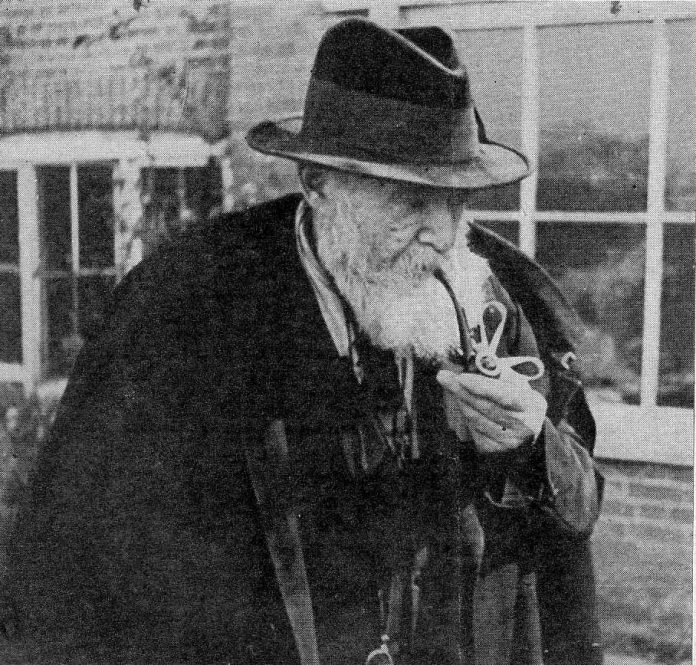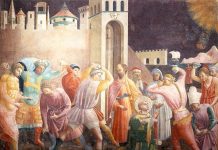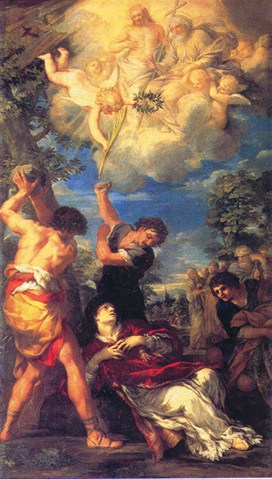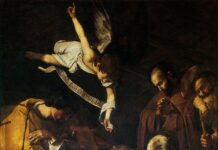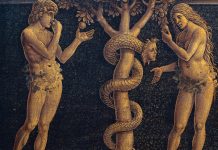Blessed are they who are persecuted for the sake of righteousness, for theirs is the kingdom of heaven. Matthew 5:10
Hilaire Belloc’s somewhat long and forgotten Survivals and New Arrivals (1929) is worth looking at again from a contemporary perspective. Subtitled The Old and New Enemies of the Catholic Church, this book reveals Belloc to be one of the most brilliant defenders of Christian orthodoxy, a role he played for many years alongside G.K. Chesterton and C.S. Lewis. Belloc’s book asserts that for twenty centuries every religion or philosophy that has sought to defeat Catholicism has failed in the attempt and itself been more or less undone. As he succinctly puts it:
To grasp the situation of the Catholic Church today we must appreciate which of the forces opposing her are today growing feeble [moribund], which are in full vigor [survivals], which are today appearing as new antagonists, hardly yet in their vigor but increasing [new arrivals].
The Feeble Enemies
Among those assaults on the Church growing feeble, Belloc counts the Biblical attack; that is, the argument that if Church doctrines aren’t in the Bible, they’re all made up (known in North America as the “Fundamentalist attack”). That attack has been slowly drained of its significance since the Reformation by the gradual realization (even among Protestants) that the Church created the Bible, the Bible did not create the Church. Certainly it was the Catholic Church that assembled and approved the books of the New Testament at the Councils of Hippo and Carthage in the late 4th century, more than a thousand years before Martin Luther began to attack any of the “made up” doctrines the Church claimed to have found rooted in the Gospels and the Epistles. Belloc believed Biblioatry was dying and would soon be dead. Indeed, it was already in its death throes in Europe by the time John Henry Newman, an avid student of early Christian history, had abandoned the Church of England for the Church of Rome.
Another attack that Belloc saw continually growing feeble was the attack of Materialism. From the 18th until the end of the 19th centuries, Materialism, the notion that only matter and energy exist, was dominant. The temptation to think so was no doubt furthered by advances in science that relied upon measuring and testing the material world and deducing its laws accordingly. The success of industrial science especially led to the belief that material causes and effects are all that really matter. However, soon enough the materialist began to be embarrassed by questions he could not answer. For example: “What is the material composition of a truth?” “If it exists in the mind, and the mind relies upon the brain for discovering truth, should we not be able to locate any truth in the brain, isolate it, touch it with a prodding instrument, remove it, and explore it under a microscope? Such a question must seem absurd, but what other questions are we to ask about truth if truth is only a part of the material world? Belloc concluded that, though its heyday was a grand one full of absolute conviction, Materialism was doomed in the foreseeable future.
Next among the attacks is the wealth and power argument. It has been seriously argued for centuries that the rise of Protestantism was consistent with the rise of prosperity in the West, and that those nations least able to achieve and maintain prosperity were the Catholic nations. Comparison of the history of Spain and England since the 16th Century is allegedly just one example to illustrate the point. Moreover, the wealth and power of the Catholic Church, even in dominantly Catholic nations, continually declined during the rise of capitalism and the democracies; the fate of the papal states in Italy during the 19th Century would seem to prove this. It was believed long ago that this ascendancy of Protestant industrialism would be permanent and a proof of the superiority of that religion. But the truth is that it is not permanent. If judged by the standard of human happiness, there is no reason to believe there is more happiness among the Protestant industrial nations than among the agrarian Catholic ones. How does one judge happiness for the millions of suffering humanity, women and children alike, toiling in the dirty and dark factories of Protestant England and North America? But it was the Catholic Church that has challenged this inhumanity of the wealthy against the poor. And when international communism led by Moscow promised to send capitalism to no-man’s land, it was the popes of Rome and the people of Poland that railed against and resisted that godless economic system sworn to deprive people of their own property and freedom.
We turn now to the historical attack against the Church; this view, ever since Martin Luther, has succeeded in breaking up Christendom into hundreds of sects, for it is based upon the argument of many Protestant ‘denominations’ that the main doctrines of the Catholic Church were never taught in the early Church but later evolved by Rome’s invention. These doctrines include the Eucharist, the primacy of the Apostle Peter and his successors, the Trinity, and other such teachings. Take, for example, the discovery that the supposed Donation of Constantine (the document often referred to as proof of the legitimacy of the papacy) was riddled with factual errors. That is used by anti-Catholic historians to discredit the authority of the papacy, though that very authority had been recognized centuries before Constantine. As to the matter of the Eucharist and the Mass, Belloc waxes eloquent:
Tell a man, for instance,that the Host was not elevated before the eleventh century; that the celibacy of the clergy was in violent debate during the tenth, and that in practice it was not universal: Tell him that appointment to Bishoprick And Abbacy had virtually been in lay hands long before the outbreak of the quarrel of Investitures, that genuflection and lights and bells are of such and such dates – in each case the plain man who was so used to the Elevation, Celibacy, Clerical appointment, etc., that he could imagine no other condition, would be shocked. He would say to himself: “This, which I had believed to be the very material of my religion, I thought to be also as much a fixed part of it in the earliest times as it is today. Now that I have been shown this was not the case, I find all my religion untrustworthy.
This kind of attack on the Catholic Church was quite effective for a time, mainly with uneducated Catholics who had not the sophistication to understand that the teachings of the Church were in no way altered or violated by changes in the way those teachings were practiced or exercised. The superficial changes in the celebration of the Mass, for example, did not alter the belief common among early Christians that the Eucharist was indeed to be worshiped as the Body and Blood of Our Lord. The manner of deciding who should be a bishop did not alter or harm the belief that someone should be a bishop. Generally speaking, this kind of attack, like the fundamentalist attack, was doomed to go away, partly because it was seen that another more effective attack was in the offing.
This later attack Belloc calls “Scientific Negation” or the philosophy that we know today as scientism). The gist of this attack on Catholicism is that science has proven its method of acquiring true knowledge, and any supposed insights about our human nature not verifiable by the scientific method can safely be called poetry or fiction. Now this way of thinking prevailed for two centuries, during which time scientists discovered many truths using the scientific method of measuring the data observed by them. All the world hailed these achievements, so why is it any wonder that, filled with inordinate pride, scientists should begin to think their method was the only method useful in acquiring truth? It was but a small leap to suppose that the extravagant claims of religion, such as the belief in miracles, should be easily dismissed as unscientific, and therefore false. And since so many of the claims of religion are, like miracles, of an other-worldly reality, why should religion in general not be dismissed as so much poetry or fiction? By this method all religion and all metaphysics are successfully reduced to intellectual ashes, or as Belloc puts it, Scientific Negation. But the triumph of Scientific Negation was delusional, as even many of its proponent have begun to suspect. The generation of scientists that followed Darwin were full of this heresy, which persists even to this day; but there is a glaring fault in such thinking that stares everyone down. Science is not static. The discoveries in one age of science are contradicted by discoveries in the next age. Moreover, thanks to some scientists the invention of nuclear bombs would become an assurance, if not for the existence of a heaven above, then for a hell here below. Continuing scientific discoveries, from the Big Bang theory to the seemingly designed origins of life on earth, make increasingly improbable the notion that all can be accounted for by scientific observations and measurement. Belloc did not live to see it happen, but the postulation of multi-universes that has been offered to explain the origin of a universe without a creator God is so far removed from scientific evidence that the conclusion to be drawn seems clear to any thinking person: that some scientists will abandon science itself in favor of fantasy if it will just help them get rid of God and religion. Having disposed of the arguments against Catholicism that still barely survive, Belloc goes on to address the main current opposition to Catholic thought.
The Main Opposition
According to Belloc, the dominant feature of the main opposition to religion in his day was its full confidence that it will succeed in attacking the so-called truth and beauty of the Catholic faith. This attack comes in three forms: Nationalism, Anti-Clericalism, and the Modern Mind. These three enemies of the Catholic faith are bereft of doctrines that directly contradict the doctrines of the Church. Rather, they contradict, purely and simply, the Church itself; they are three modes of profound hatred built upon shifting and sinking sands that swallow up any possibility of their being true or beautiful.
#1 Nationalism
According to Belloc, nationalism in the West is much like a religion; so much so that it rivals true religion in the intensity of its worship of the nation, and its willingness to devote all to the cause of the nation regardless of human cost. Now this is the way Christian martyrs would view the beauty and truth of their religion, something surely worth dying for. Belloc does not dispute the need for citizens to be patriotic; that is the glue that keeps a nation well organized, happy, and productive. What he disputes is the tendency to see the nation as an end in itself, which it is not. God is an end because we are all directed toward God, whether we know it or not. We are not all directed to the State as an end. If the State is to be our end, we are in fact doomed, for governments of men will assume the rights of gods who may reward and punish when we go against them. They might well assume the right to ostracize or punish those who worship false gods. Some such worshipers of false gods might be regarded as the Catholics who (so far as the nation worshipers are concerned) are too Catholic for their own good. That fact in England was well illustrated long ago. King Henry VIII set his own will against the Catholic Church when he defied the pope, and put himself above the pope, not to mention persecuting those Catholics who dared to oppose his will. Elizabeth I carried on the persecution and weakened the Church even more. Ever since, the Catholic Church has taken second place to the national tax-supported Church of England. Had Belloc been writing just five years later, he could have cited Hitler and Mussolini to illustrate his point that Nationalism was dead set against the Church, and that the national gods were to be worshiped, not Jesus Christ.
#2 Anti-Clericalism
Anti-Clericalism is simply defined as the hatred or distrust of all Catholic doctrine and clergy. Why is there so much anti-clericalism in Protestant cultures? It must be because the Catholic Church is so universal, and recognizes itself as the true and universal word of God. This goes against the Protestant grain, since Protestantism from its inception has been a religion of separate nations advancing the claims of their separate sects in each nation against the claim of a universal Church that would unite all nations in the one universal Truth preached by Jesus. The loyalty to Christ’s truth must be divided, or divisible, in the Protestant mind, and this accounts for why Protestant sects, quite different from each other, are all quite different from the Church they perceive to be the common enemy. Speaking of the Church, Belloc says:
She proposes to take in men’s minds even more than the place taken by patriotism; to influence the whole of society, not a part of it, and to influence it even more thoroughly than a common language…. She does not admit the thesis that legislation and executive action, in Her eyes immoral, is no concern of Hers; that in this Christendom which She made She is to tolerate by silence and acquiescence what is damnable.
But the liberal mind does not mind being illiberal, or even damnable. It insists on the right to be both, and that the Church must not interrupt its mission of serving the world, the flesh, and the devil. Thus, the doctrine of the separation of Church and State. The State will leave the Church alone, but only if the Church will leave the State along. Loyalty to Christ must give way to Caesar. (Consider, for example, the Johnson Amendment in our time, designed to muffle clerical opposition to candidates for political power who oppose Christian moral law.) The Freemasons, even since Thomas Jefferson, have been organized like an army to oppose every interest of the Catholic Church. Masonic hostility to the Church is world wide. It is tempered in societies where the Church is already weak, but volatile where it is strong. For Belloc, the anti-clerical mind knows that ultimately it is engaged in a duel to the death with the Catholic Church, and its hostile attacks will not end until then. Belloc discusses at length the decline of the anti-clerical movement in his time (1929) but very soon the rise of Hitler and the progress of international atheistic communism would give renewed energy and hope to those who would destroy the Church. Since Belloc’s death (1953) whatever optimism Belloc had would seem to be dissipated by those events that have brought down the influence of religion in our own time and the great crisis of confidence Catholics have suffered with regard to many of the Church’s traditional teachings and Her moral authority, this brought on by the liberal cancer within the Church.
The Modern Mind
Belloc regards the worship of the modern mind as the most destructive type of attack on the Church; that is to say, the worship of the latest pronouncement on any subject, no matter the source. The latest verdicts on religion, of course, are generally uttered by those who have no religion, and therefore little or no authority to speak. They give no credibility to the supernatural, and almost any religious tradition will be subjected to name-calling, the most common slur being “medieval.” As Belloc puts it:
… (the modern mind) will gaze upon that most hideous of human prospects, the industrial town, and compare it favorably with a medieval city … it will call a society wealthy when a great part of its inhabitants are half starving; it will believe any new hypothesis in physical science to be ascertained fact, though it has assisted at the destruction of half-a-dozen other such hypotheses within the last fifty years.
The modern mind, on the one hand, allows that there might be absolutes, but on the other hand that we cannot know them. It tells us to believe in science, then tells us that reason itself is suspect. Only since Einstein discovered relativity have all things come to regarded as relative. Among these relatives, moral relativism reigns supreme. Good may now be made to seem evil, and evil good. It is not really surprising that Einstein found the moral dogmas of Judeo-Christian heritage so repulsive.
Then we have compulsory public education for all; but amid all this compulsion in the classroom the one absolute that Catholics would like to see their children taught, the natural desire to worship a just and merciful God, is absolutely not allowed even to be mentioned. (In the United States this phenomenon did not take effect until the Supreme Court in 1962 declared prayer in the public schools to be unconstitutional, no doubt the opening salvo of the atheist war on religion that has led to the decline of religion in America.) Moreover, Belloc alleges, public education contains a certain dogma implicit in compulsive attendance: public education will be progressive. The attendant implication is that progress sweeps away the dead debris of the past. Moreover, the particular dead debris that most of all needs to be swept away is the role of the Catholic Church in creating and sustaining Western Civilization. Hence, the literal absence of any substantive reference to the contributions made by Catholics and the Church down through the ages.
The popular press and media can also be counted on to serve the enemies of the Church. It can do this several ways: by ignoring religious matters that need to be discussed; by broadcasting scandals of religious figures; by constant drum beating for progressive values that tend to obscure or even oppose traditional values; by the press elevating the imbecility of the modern mind through oversimplification and sensationalism; by serving political parties with demagoguery, especially the party of Nationalism that is so constantly at war with the Church; by giving secular voices a forum in which to speak boldly while obliging Catholics to speak boldly only in Catholic forums, where their chances of confronting secular thought on a level playing field are decidedly limited.
New Arrivals
Belloc next addresses those new arrivals waiting in the wings for their cue to attack the Church. Because they are behind the curtain, it is more difficult to identify them, give them a name, and detail their features. Belloc so far has addressed the attacks mounted against Catholic theology, but now he sees coming an attack on Catholic moral teachings, a new Paganism that will surely rival, or even exceed, that of ancient Rome. Belloc defines the new Paganism as a religion that defies religion itself. The new Pagan seems not to have a well developed conscience based either on natural law or scripture. Belloc asks whether the new Pagan thinks about himself as having any other purpose than to think about his food, his drugs, and his genitals. This new Pagan sees no larger metaphysical purpose to his being. He neither considers whether he will survive his physical death in any form, nor does he worry about being judged. In short, he is the antithesis of Catholic. He is fallen, as Adam fell, but imagines his godless world still a Garden of Eden. For God, he has substituted the image of Satan, for he is made in Satan’s likeness, a rebel to the last. Defying all tradition, he imagines himself free, free at last to rule in his self made living hell.
But in truth, this free Pagan despairs. He worships the irrational and elevates the ugly over the beautiful, as can be witnessed in the new literature, architecture, painting, and music. Most of all he advocates the dissolution of morals, which is ethical despair. If in any single institution it can be seen that the new Pagan despairs, it is that of marriage. Belloc was right to detect in 1929 what we have seen growing exponentially ever since. As he puts it, “… we may truly see that the facility and frequency of divorce is the test of how far any society once Christian has proceeded towards Paganism.”
The rapid progress of paganism may be found very much in the association of Europe with alien civilizations, especially of Africa and Asia, but mainly with those outside influences that are philosophically atheistic. Belloc drives his point home:
It is not a good thing; it is a very bad thing, this new respect for the non-Christian and anti-Christian cultures outside Europe. Insofar as it progresses it will inevitably breed, as it has already bred in so many, a contempt of Christian tradition and philosophy, as being at once old-fashioned and puerile. There is more than one prominent European writer professing not only close acquaintance with, but reverence for, the Buddhist negation of God and personal immortality; at the other extreme you have the respect for the pagan ruthlessness and the Pagan doctrine of right-by-conquest.
Yet another formidable enemy of Catholicism is Islam, which Belloc regards as both an old threat and a new arrival. It ceased to be an old threat when it fell behind Europe’s rapid advance toward industrial technology and weapons production. But more recently Islam’s rapid expansion worldwide has resurrected its contest with the West, and it still recognizes Catholicism as its most formidable rival. Islam’s recent growth signifies that alarm bells should ring, yet Belloc reminds us that Islam itself is the creation of a prophet who drew his inspiration from the Catholic Church, and therefore Islam is in reality a heresy, since it professes to admire Jesus and Mary so much. Whether The Church and Islam will ever come to terms remains an open question.
New sects of a subjective nature, based not upon tradition or authority but rather upon personal spiritual experiences, have joined Islam in the contest for a dominant world religion. One such sect that is popular at the moment is Christian Science. Belloc does not see these kinds of sects as possibly holding any future sway over the human race. For Belloc, “Your purely subjective religion does not appeal to evidence. It appeals to intensity of enthusiasm, and to little more. Its lack of substance and its probable lack of endurance gives us little reason we have much to fear from the subjectivists.” (Yet just several years later Hitler’s movement would be filled with grossly imaginary invocations of dark occult forces at work, these based upon the pagan black magic religion of Germany that existed before the arrival of Christianity.)
Future Prospects
Belloc sees Christendom (not Christianity) as having been reduced to a state of ruin by the Pagan juggernauts of our time. Yet the various engines of opposition to the Church have no well defined basis for their existence. There is nothing positive about them, and all that is negative in them begs an opportunity for correction. The Catholic Church over two thousand years has built a well defined philosophical and theological basis for its existence, and therefore is in a position to convert the modern world away from its selfish despair into something a good deal more noble and spiritual. The New Paganism has chosen to evade the Great Questions of God’s existence, the human soul, why we were created, what our destiny is, etc. It is as if these matters were settled without even being examined. But these matters have never been evaded by the Church, and the Church, if it were just listened to by those who see no reason to do so, would be in a position to conduct and prevail in the Great Debate.
The New Pagans, for example, dismiss the Christian belief in Resurrection on the grounds that it goes against the laws of chemistry. Clearly, they have no real notion of the Christian doctrine, which does not assert anything like a resurrection that results in renewing the carnal pleasures of the present life. Yet this will be the New Pagan’s go-to refutation of any Catholic doctrine, buttressed by the foolish notion that you don’t have to examine the matter any further than your first superficial impression. Thus, Belloc concludes, “The success or failure of our effort against the New Paganism will depend much more on letting people know what the Catholic Church is, than upon anything else.” Here Belloc anticipated by more than fifty years the call by Pope John Paul II for a new evangelizing of the world.
Post Script
Near the end of his reflections Belloc asks whether there is room for the hope that Christendom will be restored. He thinks the signs do not immediately point to that. The downward trajectory of faith and morals everywhere cautions against optimism. Yet, Belloc suggests, the Catholic challenge to the way of the world is still pregnant with hope. Belloc had urged elsewhere that the Church is a perpetually defeated thing that always outlives her conquerors, and that unbelievers will have to wrestle with how to explain that the Church is not supernatural when it has survived being governed with such “knavish imbecility” for two thousand years.
May it not be that there is a rock bottom below which a godless morality cannot go, and when this point is arrived at, the time will be ripe for real hope and renewal of faith? Belloc suggests Rock Bottom is imminent, and there will be no direction left to go but back to the Church. If he lived in our time, he would see that the Rock Bottom Pagans as enemies of the Church are surely the last of the New Arrivals and are now, in most ways, the Main Opposition.
”It is further becoming apparent,” Belloc insists concerning alternative solutions, “that there is, as yet, no rival in this respect to the Catholic Church…. Our civilization is as much a product of the Catholic Church as the vine is the product of a particular climate. Take the vine to another climate, and it will die…. But if I be asked what sign we may look for to show that the advance of the Faith is at hand, I would answer by a word the modern world has forgotten. Persecution. When that shall once more be at work it will be morning.”
Again, had he lived in our time, Belloc would have noted the various ways the Catholic Church is being persecuted, not just by those without, but also by those within the halls of ecclesiastical power, a phenomenon that was hardly noticeable in Belloc’s day. That some will to suffer persecution and even die for Christ must nurture our belief that Christ still lives, and that what he promised is so very true … “I will be with you always, even till the end of the age.”

